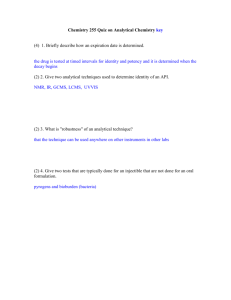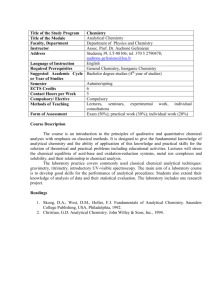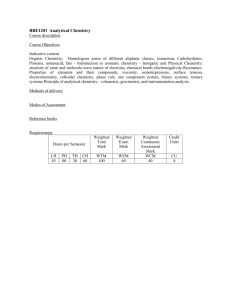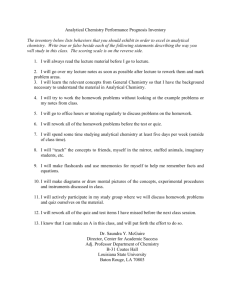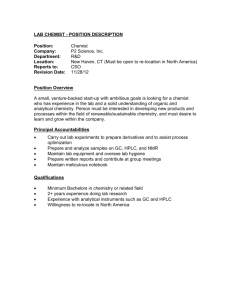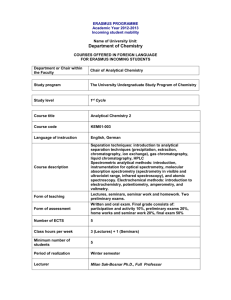“Evaluation of case studies in teaching complicated Analytical
advertisement
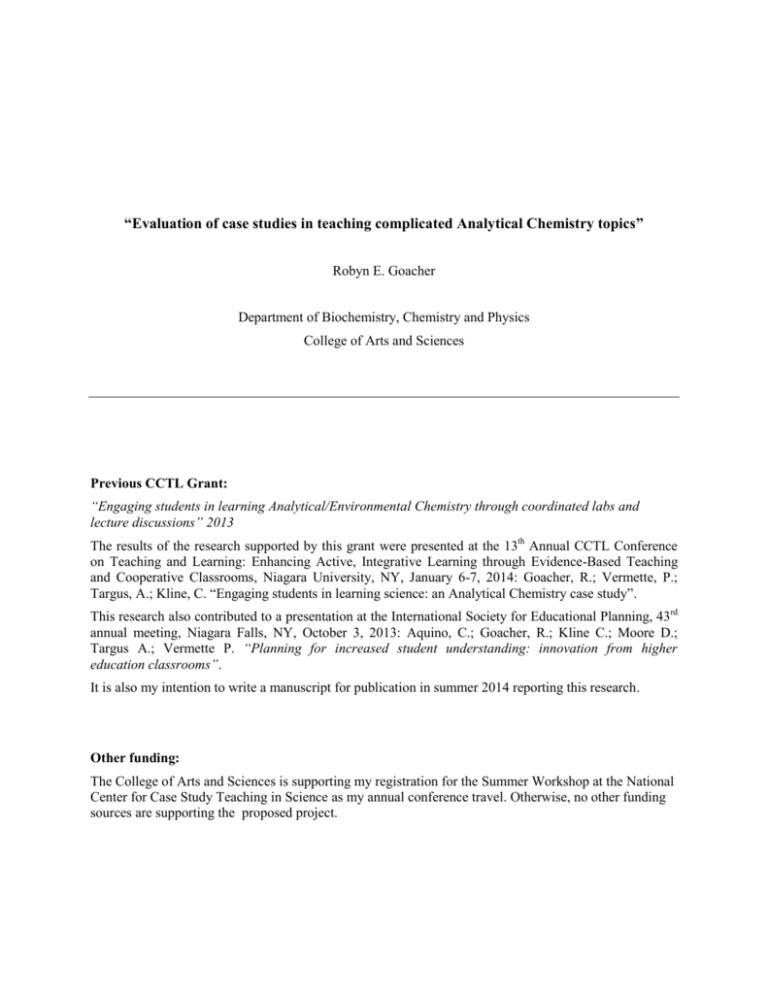
“Evaluation of case studies in teaching complicated Analytical Chemistry topics” Robyn E. Goacher Department of Biochemistry, Chemistry and Physics College of Arts and Sciences Previous CCTL Grant: “Engaging students in learning Analytical/Environmental Chemistry through coordinated labs and lecture discussions” 2013 The results of the research supported by this grant were presented at the 13th Annual CCTL Conference on Teaching and Learning: Enhancing Active, Integrative Learning through Evidence-Based Teaching and Cooperative Classrooms, Niagara University, NY, January 6-7, 2014: Goacher, R.; Vermette, P.; Targus, A.; Kline, C. “Engaging students in learning science: an Analytical Chemistry case study”. This research also contributed to a presentation at the International Society for Educational Planning, 43rd annual meeting, Niagara Falls, NY, October 3, 2013: Aquino, C.; Goacher, R.; Kline C.; Moore D.; Targus A.; Vermette P. “Planning for increased student understanding: innovation from higher education classrooms”. It is also my intention to write a manuscript for publication in summer 2014 reporting this research. Other funding: The College of Arts and Sciences is supporting my registration for the Summer Workshop at the National Center for Case Study Teaching in Science as my annual conference travel. Otherwise, no other funding sources are supporting the proposed project. Case studies in Analytical Chemistry 1. Goals of the project and the impact the project will have on active, integrative learning: The goal of this project is to evaluate the impact that case study teaching can have on the instruction of important, complicated, and sometimes boring science topics in my main sophomore-level course, Analytical Chemistry. A past CCTL grant studied the incorporation of lab into the same semester as the Analytical Chemistry lecture. This, combined with increased active learning through discussion days, resulted in improved student performance on the course final exam, and improved student perceptions of the course. However, students continued to rate the course experience low on their perceived relevance of the topic to the outside world. Therefore, I would like to evaluate case studies as an additional type of active integrative learning, to target the issue of course relevance. In May this year I will attend the Summer Workshop at the National Center for Case Study Teaching in Science, conveniently hosted at UB. This five-day workshop “focuses on training science faculty to teach with case studies, to write their own cases, and to assess their students’ learning with cases.” Using what I learn during this workshop, I plan to develop case studies to use for the Analytical Chemistry class. I would like to target the case studies around environmental, medical, and legal topics so that the students will identify the course material with important real world applications. The cases would pose situations in which the students will need to learn and apply important (and often dry) concepts about data quality, calibration methods and statistics. 2. How active, integrative learning will be incorporated into the course: I will form case-study groups based on diversity of student interests and prior knowledge, assessed through first-day getting-to-know-you activities. Each of three course units will have separate cases. Students will read the written case as homework and write a reflection listing questions and what they would need to know to solve the case. In class, students will share their questions within their group and then rotating through groups. During these discussions I will introduce new vocabulary and concepts matching their ideas. Subsequent lecture activities will revolve around these concepts, giving impact to student learning – students having identified that they need to know the material for a purpose. Students will actually solve the cases through coordinating laboratory experiments and the legal implications of correct scientific results and recording strategies will be emphasized through innovative lab report scenarios in which students must defend their data in a mock legal trial in class. Teams will alternate between defense, prosecution, and jury for the different cases, with all teams having performed the experiment and being familiar with the case. Finally, students will reflect on their own performance, their peer’s contributions, on what they’ve learned through the case, and on questions sparked by the case and still left unanswered. My hypothesis is that by working on cases in this way the students will have more fun, gain greater community ties, explicitly link course content to important real-world applications, recall the concepts at greater depth in the future, and build research and communication skills. 3. Assessment techniques used to evaluate the project effectiveness: The case studies will be continued throughout the whole semester versus just in one unit so that their impact will be magnified. At the end of the semester, the impact of the case studies will be evaluated qualitatively using student perception surveys administered by Cynthia Kline, and through comments in the student reflections on the cases. The student perception survey results will be compared using identical questions asked last year of students in the course with active learning but no case studies (Fall 2013), and the upcoming case study class (Fall 2014). Particular attention will be paid to survey questions about relevance of the course to the real world, and working with diverse populations. I also plan to include in the next survey several new questions about how the students view and value the case studies in particular, and what kinds of connections they see between the course and outside topics. page 1 of 2 Case studies in Analytical Chemistry Quantitative assessment of how the case studies impact student learning will be done by comparing scores from the two years for both the unit exams relating to case content, and the whole-course final exam. The final exam includes the ACS standardized exam in Analytical Chemistry (2007 form) as well as a set of take-home problems which I wrote to evaluate effectiveness in problem solving using realistic data sets. The ACS exams are published by the American Chemical Society and their content is kept strictly confidential. National norms are available for this test. Long-term retention of the course material will be harder to assess, especially because of the varied experiences of the students after they leave the Analytical Chemistry course, which may or may not reinforce concepts from the class. However, I would like to engage graduating seniors in an exit survey regarding certain key concepts from the course, so that information retention 1-2 years after the course can be assessed and compared between the students taught with and without case studies. I may have the opportunity to do this as part of the Senior Seminar course, which I also co-instruct. If either student perceptions of course relevance or quantitative test performance increase, I will keep the case studies in the curriculum. If after a fair crack at the case study approach for the full semester, there is no quantifiable change in fun, meaning or achievement, I may abandon the approach for future years, or consult with case study experts to see if my approach can be refined. 4. Contribution to the understanding and advancement of active, integrative learning at NU: This project will hopefully demonstrate how practical it is to use case study teaching in foundational science courses at NU. If successful, this could inspire more people to approach instruction through cases to emphasize connections both between concepts within an individual course, and between concepts in different disciplines (e.g. science, law, communication). While of benefit for many students, this crossdisciplinary connection would particularly contribute to students studying under the new Environmental Science curriculum, which I have developed with Bill Edwards in Biology. If this program undergoes successful approval, these students would study in the first inter-departmental science major at NU. Enhancement of connections between science and application may also help raise students’ perceived value of a liberal arts education, and therefore deepen the value of their experience at NU, helping to create more committed alumni and an improved reputation for our programs. Within the Biochemistry, Chemistry and Physics department, my attempts using case studies would also serve as a proof-of-concept experiment for an idea we are considering regarding making new advanced integrated labs instead of isolated labs for each course. We’d like to teach our students lab skills in a way that improves relevance and that crosses the boundaries between sub-disciplines in Chemistry. However, this would require a change to our official curriculum cards, and it will be easier to take this leap if a small-scale approach in the Analytical Chemistry class proves successful. Practically, the aspects I am most concerned about are assessment of student performance – for example, how to balance individual versus group grading – and managing time in the classroom, e.g. balancing possibly increased home study with more in-class activity. I hope to gain new ideas from the Case Study workshop on these matters, and I will be attentive to study my own attitudes and approaches throughout the semester, in terms of testing and evaluating students, and juggling my course plans. 5. Dissemination of results emphasizing the scholarship of teaching and learning: Preliminary results of this project will be presented at the January 2015 CCTL conference. Complete results will be synthesized into a publication for submission to a journal such as the Journal of Chemical Education. Results will likely also be presented at other conferences in the SOTL field. I would additionally like to share my experience as the instructor for science case studies through a TLC or brown bag talk. page 2 of 2
